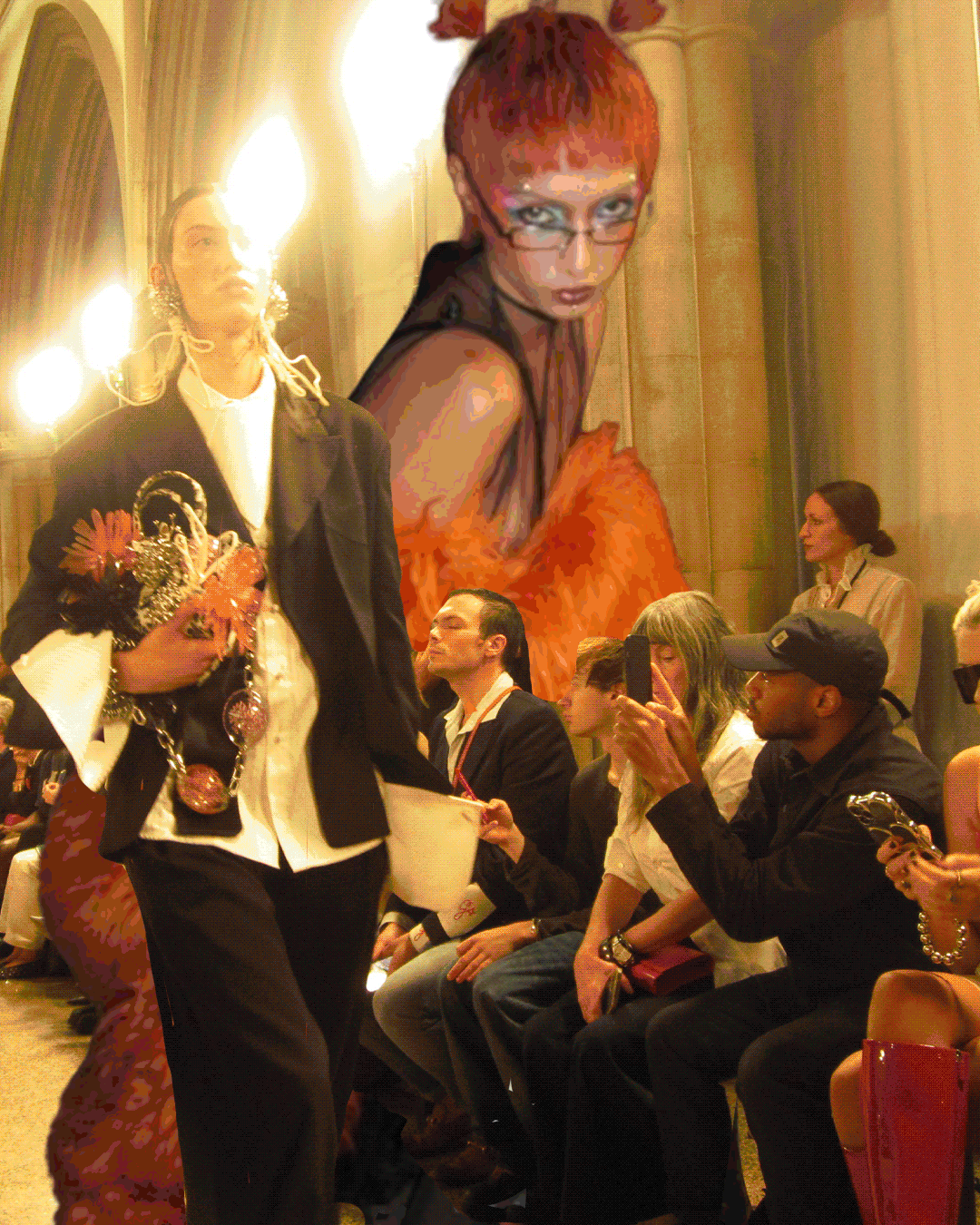Did she spill something?
- Share via
It’s easy to see why Conde Nast snatched Lauren Weisberger from the jaws of obscurity and plopped her in the anteroom of fashion’s most powerful editor, Vogue’s Anna Wintour. Weisberger landed a job as Wintour’s assistant even though she lacked experience and that other wampum of the glossy magazine world -- connections.
But Weisberger fit the fashion magazine mold. She has the kind of well-scrubbed, blond/blue looks and coltish bearing that are always so welcome at Vogue’s gateways, not to mention within its pages. Indeed, at Conde Nast, whose magazines show America how it should look, looking good is a must.
And in the fashion universe, where first impressions count -- and people don’t always bother with second impressions -- one’s face can be one’s fortune. But if the fortune doesn’t follow, an American beauty can always dish a little.
Weisberger, with her Mona Lisa smile gracing the back cover of “The Devil Wears Prada” (Doubleday), serves up a gleefully gossipy new novel about Andrea Sachs, an assistant to fashion’s most powerful editor, the fictional Runway magazine’s Miranda Priestly.
The wildly imperious Miranda makes Andrea’s life miserable with her relentless demands: She requires the assistant to order her cooked breakfast, and to keep ordering it again and again if it cools off before she arrives at work. Meanwhile, she prohibits her assistants from eating in front of her or going to the bathroom if it means a phone will be left unanswered, however briefly.
At Christmas, Miranda is showered with Fendi bags and hundreds of other exorbitant gifts. The holiday tithing is trumped only by her own extravagance, such as her purchase of a $40,000 Chanel gown (before editor’s discount), which costs $670 to dry-clean. Andrea calls her “an empty, shallow, bitter woman who has tons and tons of gorgeous clothes and not much else.”
By the way, Miranda, a size-0 British import, is not a thinly veiled portrait of Wintour, also a size-0 British import and an exacting editor whose thriftily dispensed social skills have netted her the nickname Nuclear Wintour. In case you were wondering.
“I don’t think it’s a roman a clef,” says Weisberger, 26. “Other people are calling it that. I’m calling it a novel.”
Weisberger is nursing a cup of coffee in the lounge of the Regent Beverly Wilshire Hotel, where Doubleday has booked her for the L.A. stop of her 10-city tour. The publisher’s publicity department spent a year doling out dishy snippets to the press, amping up the volume on prepublication buzz about the book with reports of Weisberger’s $250,000 advance and $600,000 sale of movie rights to Fox 2000, where “Prada” is being developed by producer Wendy Finerman.
Doubleday’s investment is hefty considering that Weisberger is a novice novelist, but the campaign, with its nudge-nudge, wink-winking about the Vogue connection, is clearly working. The beach book leapfrogged over some scorching reviews onto the bestseller lists soon after its debut, settling in at No. 2 on Sunday’s Los Angeles Times fiction bestseller list.
The author’s disclaimer notwithstanding, a lot of media types are saying that its prime selling point is the peek it promises behind the curtain of the glamorous, mysterious Wintour. As former Wintour protege Kate Betts wrote: “Of course nobody would be interested in this book if Weisberger were spilling the beans about life under the tyrant of the New Yorker (‘The Devil Wore Brooks Brothers’?).”
Yet Weisberger insists that Miranda is really just that handy tool of all-tellers everywhere -- a composite.
“It’s a book that comes from so many different areas of my life,” she says. “Yes, my experience at Vogue. Certainly, my experience at my job after that, working at Departures [magazine]; a lot of my friends’ experiences. All worked as assistants, not just in magazines but in book publishing and advertising and public relations.
“And we all sat around late at night and complained about things we had to do and whined and bitched about our bosses. And a lot of it comes from that.”
Then what was it really like to work at Vogue?
“For me, it was an amazing experience,” she says of her stint from late 1999 to late 2000. “I had a vantage point there’s no other way to get as a 22-year-old anywhere. Whatever you say about Anna, she’s a fantastic editor. And to watch the kind of decisions she made and the way she ran the magazine was incredible.”
Was she as mean as Miranda?
“No. She’s a great editor. That’s really what I have to say about Anna.”
Weisberger says she was a small-town naif when she arrived in New York fresh from Cornell. After 10 months at Vogue, she followed a fellow editor to the travel magazine Departures, where she stepped up from being editor’s assistant to assistant editor. But she felt cramped by 150-word magazine stories, so she joined a writing workshop, where she created Andrea and Miranda.
She hadn’t intended to write a book, but at her teacher’s insistence, she submitted the first 100 pages to a literary agent she’d met at Departures. Insert happy ending here.
With her advance, she left her job to finish the book, and she hopes to continue as a full-time novelist in New York. Which could be a good thing. After blowing the whistle on her former boss, some observers think she may never edit in that town again.
Of course, Weisberger is hardly alone in dishing the hand that fed her. Work-and-tell books like “The Nanny Diaries” and “How to Lose Friends and Alienate People” have been enjoying long runs on bestseller lists. But “The Devil Wears Prada” stands out in the sheer enmity it seems to have aroused among some critics.
The New York Times likened Weisberger to Cinderella’s evil alter ego: “If Cinderella were alive today ... she would be writing a tell-all book about her ugly stepsisters and wicked stepmother, taking care to position herself at the absolute center of their story. She would be dishing the dirt, wreaking vengeance and complaining all the way. Cinderella may have been too nice for that, but Lauren Weisberger is not.”
Neither is her character, Andrea, so some critics have found it hard to sympathize with her toil and trouble as Miranda’s assistant. Andrea makes it clear that she’s above the fashion world, where she’s slumming until she gets a slot at the New Yorker.
Andrea complains about helping Miranda, who’s hosting a party for her husband’s Southern relatives, whom she’s also above -- “the big-money Carolina rednecks she’ll be serving tonight like a common waitress.”
Some critics have trashed Andrea for being a whiner and a snob, and Weisberger somehow doesn’t quite get it.
“That’s certainly not how I see this character,” she says. “I understand where that’s coming from because it is 360 pages of her being miserable about this job, but I also think that’s reality,” she says. “I would be lying to you if I told you I don’t spend hours and hours and hours complaining. All of my girlfriends would go out for drinks after work and [we’d gripe] about everyone and everything. Over and over. Anyone who’s not there, we’re talking about them.
“I certainly don’t want anyone to think of her as whiny. I wanted her to be what I think is pretty typical of a twentysomething in New York, which is pretty irreverent, a little sarcastic, a little edgy.”






